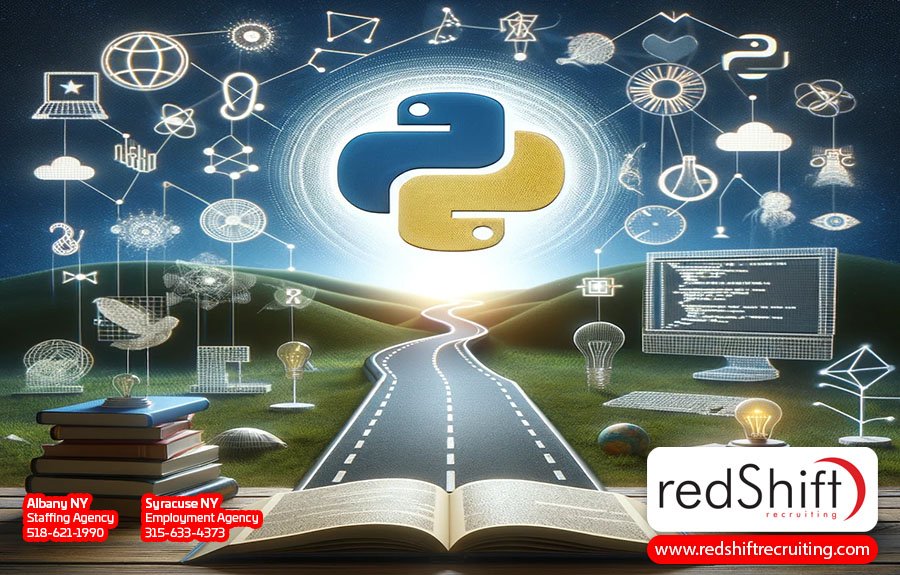How to Start a Career as a Python Developer
Python is one of the most popular programming languages in the industry today, offering flexibility and a wealth of opportunities for aspiring developers in various tech domains. While Python programming offers a versatile and rewarding career path, knowing where to begin can be daunting. In this article, we'll break down what you need to know to start a career as a Python developer, from crucial skills and educational requirements to relevant certifications and tips for gaining practical experience. By learning Python and honing your technical and coding skills, you can open doors to numerous opportunities in the field of software engineering and beyond. Whether you're a complete beginner or looking to transition into Python development, we'll provide you with valuable insights and guidance to kickstart your journey as a Python developer.
Technical Skills for Python Development
To become a successful Python programmer requires strong technical skills. First and foremost, you will need to learn Python. The Python programming language is a general-purpose programming language that is widely used in various domains, including software development, software engineering, web development, and data science. To become proficient in Python programming, you need to understand the basics of Python syntax and data structures. Familiarity with Python libraries and frameworks is also crucial, as they provide tools and resources to enhance your Python code. Additionally, having a strong foundation in object-oriented programming (OOP) principles is essential for creating well-structured and scalable Python applications.
As a Python developer, comprehensive knowledge of database management using SQL and NoSQL databases is fundamental. Proficiency in version control systems, especially Git, is critical for efficient code management. You should be skilled in developing and using RESTful APIs, as well as competent in unit testing and debugging practices. You should also be familiar with testing frameworks like pytest or unittest to ensure the reliability and robustness of your code. Additionally, knowledge of project management tools such as Jira or Trello can facilitate more effective collaboration and task management in team environments.
An understanding of basic DevOps principles and CI/CD pipeline tools enhances your ability to contribute to modern development workflows. Knowledge of relevant web technologies such as HTML, CSS, and JavaScript is required, as well as web frameworks like Django, Flask, Pyramid, FastAPI, or TurboGears. Exposure to data manipulation and analysis is also beneficial, including basic knowledge of libraries like NumPy and Pandas, as well as data visualization tools like Matplotlib and Seaborn. Additionally, familiarity with cloud services platforms like AWS, Azure, or Google Cloud can provide a significant edge in deploying and managing scalable applications.
A basic understanding of security concepts is vital for a Python developer, especially if they are working with web applications. This includes knowledge of common vulnerabilities and how to safeguard against them. Familiarity with operating systems, particularly Linux or Unix, is also important, as many development environments and tools are based on these systems. Finally, staying abreast of emerging and in-demand skills is critical to staying adaptable and promoting career growth. Areas like machine learning, AI, blockchain, and the Internet of Things (IoT) are rapidly growing fields where Python's versatility is highly valued, and acquiring skills in these areas can open up new avenues for specialization and career advancement.
Soft Skills for Python Developers
Strong soft skills are crucial to complementing your technical expertise as a Python professional. Effective communication skills help you convey your ideas clearly and collaborate with others on coding projects, while problem-solving skills enable you to think critically and find solutions to complex programming challenges. Teamwork allows you to work well with others and contribute to the success of the team. Meanwhile, adaptability is necessary to keep up with the fast-paced IT industry.
Empathy and emotional intelligence are also key to enhancing how you interact and collaborate within teams. These skills help in understanding and responding to team dynamics and client needs more effectively. Additionally, a keen attention to detail is essential, complementing your debugging skills to effectively identify and fix errors in your code. Developing a meticulous coding style will help you write cleaner and more efficient Python programs. Meanwhile, self-motivation and initiative are invaluable, as Python development often requires proactive learning and taking ownership of projects.
Other vital soft skills required include time management, the ability to efficiently juggle multiple tasks and meet deadlines, and the ability to continuously learn and grow, as the field of Python development is ever-evolving. Cultivating these soft skills will not only enhance your proficiency as a Python developer but also make you a more effective and valued member of any development team.
Educational Requirements and Alternatives
Python is one of the most versatile programming languages, making it a valuable skill for aspiring IT professionals. By mastering the basic coding structures, you can become a skilled Python programmer and open up opportunities in various fields, from software development and web development to data science and analysis, artificial intelligence and machine learning, and emerging technologies like blockchain and cloud computing.
Those who want to become a Python developer have various options to choose from. Many Python developers earn a bachelor's degree in computer science or a related field and choose relevant courses and electives for Python development. However, for those interested in specific fields like data science or web development, alternative degrees in these areas, or specializations within a broader computer science program, can be equally valuable.
Online learning platforms and bootcamps are also available, offering Python education and intensive training programs to teach Python basics. Those choosing these alternative educational paths should take care to choose reputable and respected programs. Before investing in a Python programming course, do your research and make sure the program has positive reviews, a proven track record, and recognized certifications, if applicable.
Alternatively, you can opt for self-learning using free Python tutorials and documentation, in addition to contributing to open-source Python projects for hands-on experience. Note that while self-learning offers the benefit of flexibility, it also requires discipline and access to adequate learning resources. However, engaging with online communities, finding mentors, and utilizing interactive coding platforms can help overcome these challenges.
Whether you choose to pursue a computer science degree or other traditional academic path or prefer alternative learning methods that offer a more flexible and practical approach to learning, there are many ways to learn Python and become a successful developer.
Specializations for Python Developers
Starting a career in Python development opens traditional paths in software development, where the focus is on building and maintaining software programs and applications, including both frontend and backend development. As an aspiring Python developer, you have a multitude of specializations to choose from, each offering unique opportunities. In data science and analytics, Python's prowess in data manipulation makes it ideal for roles focusing on data visualization, machine learning, or natural language processing. Similarly, the growing field of cloud computing values Python expertise, especially with platforms like AWS, Azure, and Google Cloud. For web enthusiasts, Python's frameworks, such as Django, Flask, and FastAPI, are instrumental in web development. There's also a significant demand in cybersecurity, where Python, coupled with certifications like CEH or CISSP, can lead to specialized security roles.
For those with niche interests, Python caters to areas like game development, using frameworks like Pygame and Kivy, and DevOps and automation, where its efficiency is crucial in tools like Ansible or Terraform. Python's application in scientific computing attracts researchers for data analysis, while the financial technology (FinTech) sector sees Python being used in trading platforms and financial data analysis. Each specialization leverages Python’s versatile nature, allowing you to align your career with your interests and the evolving demands of the tech industry.
Beneficial Certifications for Python Developers
Relevant IT certifications can enhance the career prospects of Python developers, and some employers even prefer to hire Python developers with relevant certifications. Python-specific certifications can validate your skills and knowledge of Python coding. These include the Certified Entry-Level Python Programmer (PCEP), the Certified Associate in Python Programming (PCAP), and the Certified Professional in Python Programming 1 (PCPP1). These certifications demonstrate your proficiency in core Python programming skills and can help you stand out in the job market.
Additionally, there are other relevant certifications for Python developers, such as the AWS Certified Developer-Associate, Google Certified Professional Cloud Developer, and IBM Certified Professional Developer-Cloud v6. These certifications showcase your expertise in using Python in cloud environments. For those working in data-related fields such as data science and analytics, certifications such as Open Certified Data Scientist (Open CDS) and Certified Associate Data Analyst with Python (PCAD) could be valuable, while professionals wanting to demonstrate expertise in machine learning might consider earning the TensorFlow Developer Certificate or Microsoft Certified: Azure AI Engineer Associate. Meanwhile, Python developers interested in cybersecurity might choose security-focused certifications such as Certified Network Security Specialist (CNSS) or Certified Ethical Hacker (CEH).
While certifications can pave the way for a specific career path in Python development, they may not be necessary for all roles. The best certifications will largely depend on your individual career goals and specializations. Additionally, there are alternative ways to validate your Python knowledge and coding skills through hands-on experience that offers tangible proof of your abilities.
Gaining Hands-on Experience
Gaining hands-on experience is crucial for aspiring Python developers to further enhance their skills, demonstrate their abilities, and solidify their knowledge in the field. Creating a strong portfolio by engaging in personal projects or contributing to open-source Python initiatives provides a solid foundation to showcase your skills and distinguishes you in the eyes of potential employers. These practical experiences offer tangible proof of your abilities and can be a key factor in securing a Python development role, particularly for those who may not have extensive work experience or formal degrees and certifications.
Online interactive coding platforms like CodePen or DataCamp can also be great resources, especially for beginners. They offer user-friendly interfaces and guided tutorials that can be helpful for practicing code snippets and jumpstarting your Python learning journey. Contributing to open-source projects is another excellent way to get hands-on experience, while solving coding challenges on platforms like LeetCode and HackerRank will help you sharpen your problem-solving skills. You can find Python projects on platforms like GitHub, GitLab, Bitbucket, or SourceForge which will not only help you hone your skills but also provide opportunities to collaborate with other developers, making valuable connections in the process. Additionally, attending hackathons or coding events can offer real-world coding experience, enhance collaboration skills, and expose you to new and innovative coding challenges and methodologies.
Internships, freelance opportunities, and part-time programming jobs are also great avenues to gain practical experience and build a professional network. Freelancing can offer a variety of opportunities for ambitious Python developers to gain hands-on experience, explore different projects and technologies, and build a unique portfolio that showcases their abilities. While it requires initiative and client focus, the learning opportunities and potential for diverse work can be highly rewarding. By embracing these opportunities, actively writing code, exploring web frameworks, and working with data analysis and data structures, you can become a highly sought-after Python developer in the programming community.
When selecting projects, prioritize those that align with your career goals, as this will help you showcase specific skills and interests to potential employers. Engaging in these activities helps in applying theoretical knowledge to real-world scenarios and builds a portfolio that can impress potential employers. Furthermore, networking within the Python development community through meetups, conferences, and online forums can provide valuable connections and insights into industry trends and job opportunities. Make the most of forums and social media groups within the Python community, as these platforms can widen your reach, offer insights into current industry trends, and open doors to potential collaborations and job opportunities.
Tips for Finding a Job as a Python Developer
To increase your chances of finding a job as a Python web developer, focus on building a strong professional network, developing your personal brand, and utilizing online job boards and platforms. Attend tech meetups and networking events to connect with other Python developers. Leverage social media platforms, especially those geared towards professionals, to showcase your Python projects and contributions. Participating in Python forums and contributing to Python-related discussions can also increase your visibility in the field, while attending industry events such as coding challenges and hackathons can help raise your professional profile and provide networking opportunities.
Additionally, make use of online platforms to expand your network and seek out potential job opportunities. Optimize your LinkedIn profile for Python job searches and explore specialized job boards for IT and tech positions. Work with an IT recruiter to identify roles that match your skills and career aspirations and to gain insights into industry trends and hiring practices. Consider creating a personal website or portfolio to display your Python projects, code snippets, and any collaborative work. This can serve as a practical demonstration of your skills to potential employers and help you build your reputation as a professional.
When applying for jobs, customize your resume to highlight your relevant Python experience, and create a compelling cover letter that demonstrates your passion for Python. Ensure that your resume is easy to read and includes specific Python projects and any relevant problem-solving experiences. Tailoring your resume to align with the specific requirements of the job you're applying for can also significantly improve your chances of landing a position with a top company. By actively engaging with the Python community and showcasing your expertise, you'll be well-positioned to embark on a rewarding career journey in Python development.
Frequently Asked Questions
What Is the Average Salary for a Python Developer?
The average salary for a Python developer can vary depending on factors such as experience, location, and industry. However, in general, Python developer jobs tend to offer competitive salaries. Most Python developers earn between $70k and $140k per year based on experience, with the average salary typically falling between $100k and $130k. Highly experienced developers with in-demand skill sets may exceed this average, and a freelance Python developer may see variable earnings based on the number and nature of the projects they undertake, with the potential to earn higher rates for specialized skills or niche projects.
It's important to keep in mind that salaries can differ significantly based on individual circumstances and the specific job market. If you want to become a Python developer, research industry averages and salary ranges for your experience level in your desired location to get a better understanding of what you can expect.
What Industries Have a High Demand for Python Developers?
From web development to data analysis, Python is extensively utilized. Python developers are particularly in demand in industries such as finance, healthcare, and technology due to this language's ability to handle complex tasks, write code, and process large amounts of data. These sectors find value in the versatility and efficiency of the Python language.
Additionally, Python developers are increasingly sought after in emerging fields like artificial intelligence, machine learning, blockchain, robotics, IoT, and cybersecurity. The growth of big data and the need for sophisticated data processing and analysis have also seen a surge in demand within sectors such as e-commerce, gaming, and media. As technology continues to evolve, Python developers can expect growing opportunities across a diverse range of industries that value the language's adaptability and robustness.
What Common Challenges Do Python Developers Face?
Python developers may face various challenges in their day-to-day tasks. These can include debugging errors and complex code, managing dependencies, and staying up-to-date with the latest libraries and Python frameworks. Python developers often grapple with performance optimization, especially when working with large data sets or in resource-constrained environments. Balancing the trade-offs between readability, efficiency, and speed can be a nuanced aspect of Python programming. There's also the challenge of integrating Python applications with other systems or technologies, which may require a broad understanding of various programming languages and tools.
Additionally, the collaborative nature of the work can bring its own difficulties, requiring developers to effectively communicate their ideas and solutions, engage in active listening, and make informed decisions. Finally, keeping pace with Python's evolving ecosystem and the rapid development of new tools and best practices requires a commitment to ongoing education and skill development. A great Python developer is adept at problem-solving, open to embracing new methodologies, and always ready to adapt to changing project requirements and technological advancements. Despite these challenges, the satisfaction of solving complex problems and contributing to meaningful projects makes a career in Python development both rewarding and fulfilling.
Can Python Developers Work Remotely or Is It Generally an Office-Based Job?
Python development can generally be done remotely, and some companies do offer developers the flexibility to work from home or any location with an internet connection. However, it ultimately depends on the company's policies and the specific job requirements. Some positions may require you to work in an office environment, while others may allow for hybrid or remote work.
If you prefer to work remotely, it's important to seek out employers who explicitly offer remote working arrangements or who are known for their flexible work policies. During the job search and interview process, be sure to inquire about the possibility of remote work and understand any conditions or expectations that come with it. Additionally, developing strong communication and time management skills can make you a more effective and reliable remote worker, which can be appealing to potential employers who offer remote Python development positions.
What Programming Languages or Technologies Are Recommended to Learn Alongside Python?
To grow in your career as a software developer, it's beneficial to learn other programming languages or technologies in addition to learning Python. These additional skills can enhance your abilities and make you more marketable in the industry. By expanding your knowledge in areas like web development (HTML, CSS, JavaScript), data analysis (R, SQL), or machine learning (TensorFlow, PyTorch), you can open up new opportunities and stand out among other Python developers. Additionally, delving into emerging technologies such as blockchain, DevOps practices, and cloud computing platforms (like AWS, Azure, or Google Cloud) can further broaden your skill set and align you with future trends in software development. Emphasizing continuous learning and adaptability is the key to staying ahead in your Python career journey.
Conclusion
As we've explored how to start a career as a Python developer, we've seen how Python's versatility in different fields, from web development to data science, offers a path filled with diverse opportunities and learning experiences, each fostering unique skill sets and knowledge. Whether you're interested in developing cutting-edge software, diving into data analytics, or innovating in cloud computing, Python can be a gateway to career advancement and technical expertise.
As you start your journey to become a Python developer, remember that each step, from learning a new Python library to contributing to an open-source project, brings you closer to your goal. With so many possibilities, Python development can be a fulfilling career choice for those who are passionate about technology and coding.
Article Author:
Ashley Meyer
Digital Marketing Strategist
Albany, NY






